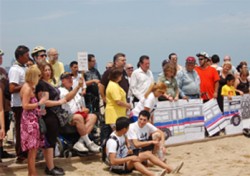By: Celia Martinez
 Bicycles occupied the pier of the 31st street beach on Saturday June 30th in the early afternoon, as residents from Little Village, McKinley Park, Bridgeport and Bronzeville biked to the beach and demanded once again for CTA officials to re-launch the 31st Street bus. “Our residents have been left in a transit desert,” said Claudia Ayala, Community Organizer for the Little Village Environmental Justice Organization (LVEJO).
Bicycles occupied the pier of the 31st street beach on Saturday June 30th in the early afternoon, as residents from Little Village, McKinley Park, Bridgeport and Bronzeville biked to the beach and demanded once again for CTA officials to re-launch the 31st Street bus. “Our residents have been left in a transit desert,” said Claudia Ayala, Community Organizer for the Little Village Environmental Justice Organization (LVEJO).
The event, “Our Route, Our Right!” organized by LVEJO invited residents from the affected communities and supporters to bike from LVEJO headquarters, 2856 S. Millard Ave to the 31st Street beach, in hopes of drawing attention from CTA officials.
The 31st Street bus was cut in 1998 due to a lack of rider-ship thus leaving commuters dependent on public transportation that reside along the 31st street route, without a standard east-west bus route for over 15 years.
“It takes the average resident in Little Village two hours to get to work,” said Ayala. “This is no longer acceptable for us.”
This is not the first effort made by LVEJO to re-launch the 31st Street bus. Approximately four years ago, LVEJO helped the CTA write a Job Access Reverse Commute (JARC) grant specifically to get the 31st Street bus back into effect. JARC grants are designed primarily to provide public transportation in low-income communities and aid these individuals in accessing jobs.
But what began as a promising solution for the residents of these communities was inevitably put to the side as the CTA began to announce a vast amount of cuts for train and bus services throughout Chicago.
And although the CTA is allegedly sitting on 1.2 million dollars from the JARC grant, they are unable to match the grant, as was originally written, because of lack of funds, something Ayala doesn’t believe to be true. The Chicago Transit Authority was unavailable for a statement.
“There have been plenty of renovations in the south side, in the north side,” said Ayala. “Everything is getting re-done and Little Village is getting left behind.”
According to Ayala, Senator Martin Sandoval, 12th district, has been involved with the campaign to get the 31st Street bus back in service, and has made attempts to pass resolution SR0795. The resolution, as stated in the Illinois General Assembly, would make the 31st Street bus a priority by using the $1,067,659 of the Chicago Transit Authority’s annual operating funds for three years. The bus would run from Cicero to the Lakefront and would serve the communities of Little Village, McKinley Park, Armour Square, Bridgeport, the Town of Cicero, and Bronzeville. Senator Martin Sandoval was unavailable for a statement.
The absence of this route affects residents from these communities on many levels. Although said it is necessary to provide a bus that would offer a more efficient way accessing jobs for residents, it is also a matter of public safety. Town of Cicero resident Flora Ramirez, a 21 year-old student from the University of Illinois, said that if the 31st Street bus were in effect, she would feel safer when commuting home from school or from her internship especially in the evenings.
“I’m not comfortable walking around that late, especially when the sun goes down,” said Ramirez, “If I had the [31st Street] bus it would be safer for me.” Rev. Tom Gaulke from First Trinity Church in Bridgeport is not directly affected by the absence of the 31st Street bus, but witnesses first hand how it affects his congregation.
“I didn’t know if this was an important cause or not when I first came here four years ago,” said Rev. Gaulke, who claimed that various members of his congregation don’t have a way of getting to a hospital due to the lack of public transportation. “People will actually come and ask me for rides to the hospital.”
Ayala said LVEJO is working with organizations like JobCorp, ATU and the Bridgeport Alliance and will continue to do outreaching in the community until the 31st Street bus is back in service. “This is about access, equality and most importantly, this is about jobs and education,” said Ayala, “We demand to have the same rights as everyone else.”










